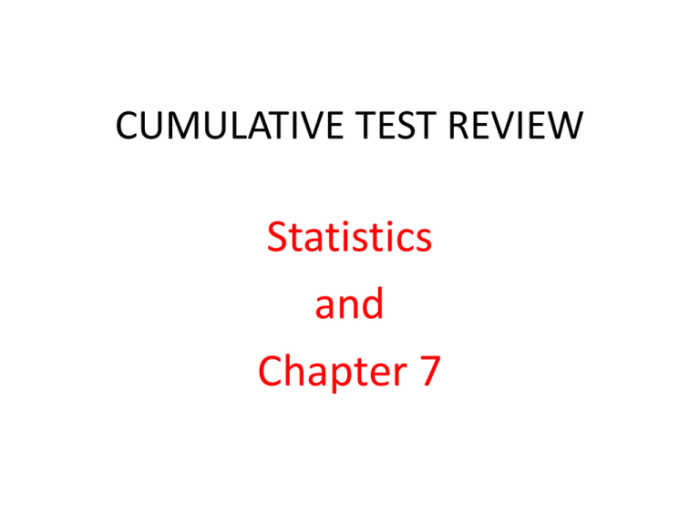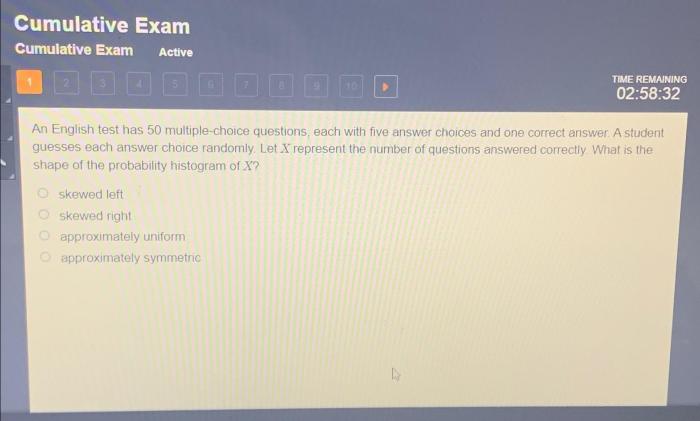Cumulative Exam Cumulative Exam Review embarks on a comprehensive journey into the realm of cumulative exams, providing an in-depth exploration of their purpose, benefits, challenges, and effective review strategies. This detailed guide unravels the intricacies of designing, grading, and providing feedback on cumulative exams, empowering students with essential tips to excel in these challenging assessments.
Definition and Purpose of a Cumulative Exam

A cumulative exam is a comprehensive assessment that covers material learned throughout a course or academic period. It evaluates students’ overall understanding and retention of concepts and skills acquired during the entire term or semester.
The primary purpose of cumulative exams is to provide instructors with a holistic view of students’ progress and achievement. They allow educators to assess the effectiveness of their teaching and identify areas where students may need additional support.
Benefits of Cumulative Exams

Enhanced Learning and Retention
- Cumulative exams encourage students to regularly review and reinforce material, promoting long-term memory and understanding.
- By connecting concepts from different units, cumulative exams foster a deeper comprehension of the subject matter.
Preparation for Future Assessments
- Cumulative exams simulate the format of standardized tests and high-stakes assessments, preparing students for future academic challenges.
- They help students develop effective test-taking strategies and manage time effectively.
Challenges of Cumulative Exams: Cumulative Exam Cumulative Exam Review
- Increased Anxiety and Stress:The comprehensive nature of cumulative exams can induce anxiety and stress in students.
- Difficulty Recalling Material:Students may struggle to recall information from earlier units, especially if they have not reviewed consistently.
- Time Constraints:Cumulative exams often cover a vast amount of material, which can lead to time constraints during the exam.
Strategies to Overcome Challenges, Cumulative exam cumulative exam review
- Regular Review:Encourage students to review material regularly throughout the semester to prevent information overload.
- Spaced Retrieval:Use techniques such as flashcards or spaced repetition software to enhance memory and retention.
- Time Management:Teach students effective time management strategies to allocate time wisely during the exam.
Effective Cumulative Exam Review Strategies

- Create a Study Schedule:Establish a structured study plan that allocates time for each unit covered on the exam.
- Organize Study Materials:Use flashcards, summaries, and practice questions to organize and reinforce material.
- Active Recall:Engage in active recall techniques such as self-testing and explaining concepts to others.
- Peer Study Groups:Collaborate with peers to discuss concepts, quiz each other, and clarify misunderstandings.
Designing a Comprehensive Cumulative Exam
| Component | Purpose |
|---|---|
| Content Coverage: | Ensures that the exam adequately represents the material taught in the course. |
| Difficulty Levels: | Balances easy, medium, and challenging questions to assess a range of student abilities. |
| Variety of Question Types: | Includes multiple-choice, short answer, and essay questions to test different levels of understanding. |
| Clear Instructions: | Provides precise instructions and time limits to ensure students understand the exam expectations. |
Grading and Feedback on Cumulative Exams
- Fair and Accurate Grading:Use a grading rubric that clearly Artikels the criteria for assessment.
- Constructive Feedback:Provide specific feedback to students on their performance, highlighting strengths and areas for improvement.
- Encourage Student Reflection:Ask students to reflect on their exam performance and identify areas where they can enhance their learning strategies.
Tips for Students Taking Cumulative Exams

- Manage Time Effectively:Allocate time wisely for each section of the exam.
- Stay Calm and Focused:Maintain a positive mindset and avoid panic during the exam.
- Prioritize Questions:Start with questions you are most confident about and allocate more time to challenging ones.
- Review Carefully:Take time to review your answers thoroughly before submitting the exam.
- Prepare in Advance:Start reviewing material well before the exam date to reduce stress and anxiety.
Query Resolution
What is the primary purpose of a cumulative exam?
Cumulative exams assess students’ understanding of material covered throughout a course or academic period, providing a comprehensive evaluation of their knowledge and retention.
How can cumulative exams benefit students?
Cumulative exams reinforce learning, enhance retention, and promote a deeper understanding of course material by requiring students to synthesize information from multiple units.
What are some common challenges students face with cumulative exams?
Students may struggle with managing the vast amount of material, time constraints, and anxiety associated with cumulative exams.
How can students effectively prepare for cumulative exams?
Effective preparation involves creating a comprehensive study plan, organizing materials, utilizing active recall techniques, and seeking support from instructors or peers.


